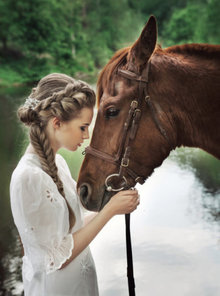As reported in Science Daily, for the first time a study shows that horses are able to distinguish between angry and happy human facial expressions.

Horse 'reading' human facial expression
We have known for a long time that horses are a socially sophisticated species but this is the first time we have seen that they can distinguish between positive and negative human facial expressions.
© 2016 by Science
Psychologists studied how 28 horses reacted to seeing photographs of positive versus negative human facial expressions. When viewing angry faces, horses looked more with their left eye, a behaviour associated with perceiving negative stimuli. Their heart rate also increased more quickly and they showed more stress-related behaviours.
The study, published on February 10, 2016, in Biology Letters, concludes that this response indicates that the horses had a functionally relevant understanding of the angry faces they were seeing. The effect of facial expressions on heart rate has not been seen before in interactions between animals and humans.
Amy Smith, a doctoral student in the Mammal Vocal Communication and Cognition Research Group at the University of Sussex who co-led the research, said: "What's really interesting about this research is that it shows that horses have the ability to read emotions across the species barrier.
We have known for a long time that horses are a socially sophisticated species but this is the first time we have seen that they can distinguish between positive and negative human facial expressions."
"The reaction to the angry facial expressions was particularly clear -- there was a quicker increase in their heart rate, and the horses moved their heads to look at the angry faces with their left eye."
Research shows that many species view negative events with their left eye due to the right brain hemisphere's specialization for processing threatening stimuli (information from the left eye is processed in the right hemisphere).
Amy continued: "It's interesting to note that the horses had a strong reaction to the negative expressions but less so to the positive. This may be because it is particularly important for animals to recognize threats in their environment. In this context, recognizing angry faces may act as a warning system, allowing horses to anticipate negative human behaviour such as rough handling."
A tendency for viewing negative human facial expressions with the left eye specifically has also been documented in dogs.
Professor Karen McComb, a co-lead author of the research, said: "There are several possible explanations for our findings. Horses may have adapted an ancestral ability for reading emotional cues in other horses to respond appropriately to human facial expressions during their co-evolution.
Alternatively, individual horses may have learned to interpret human expressions during their own lifetime. What's interesting is that accurate assessment of a negative emotion is possible across the species barrier despite the dramatic difference in facial morphology between horses and humans."
"Emotional awareness is likely to be very important in highly social species like horses -- and our ongoing research is examining the relationship between a range of emotional skills and social behaviour."
The horses were recruited from five riding or livery stables in Sussex and Surrey, UK, between April 2014 and February 2015. They were shown happy and angry photographs of two unfamiliar male faces. The experimental tests examined the horses' spontaneous reactions to the photos, with no prior training, and the experimenters were not able to see which photographs they were displaying so they could not inadvertently influence the horses.
Story Source:
The above post is reprinted from materials provided by University of Sussex. Note: Materials may be edited for content and length.
Journal Reference:
- Amy Victoria Smith, Leanne Proops, Kate Grounds, Jennifer Wathan and Karen McComb. Functionally relevant responses to human facial expressions of emotion in the domestic horse (Equus caballus). Biology Letters, 2016 DOI: 10.1098/rsbl.2015.0907
